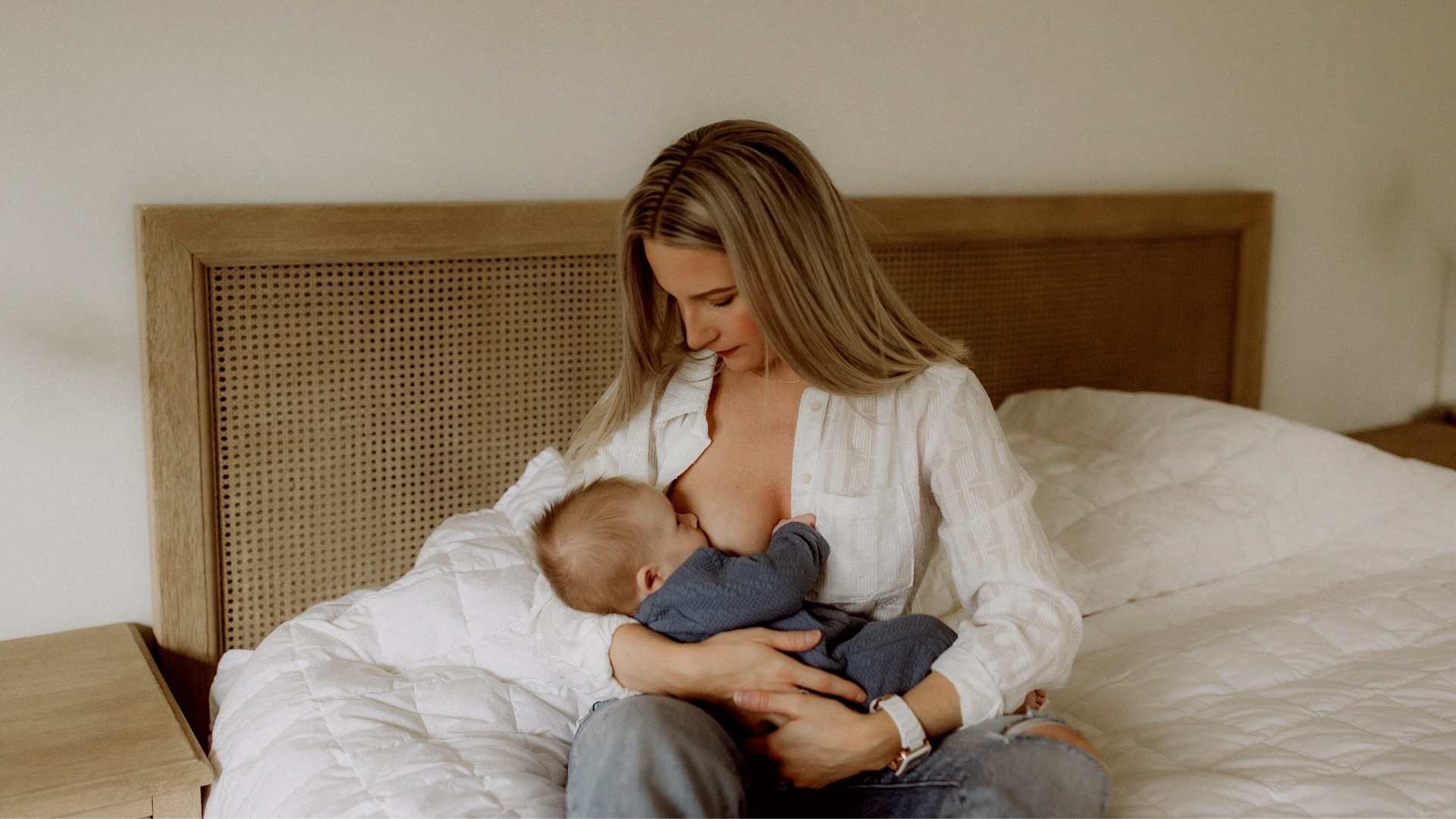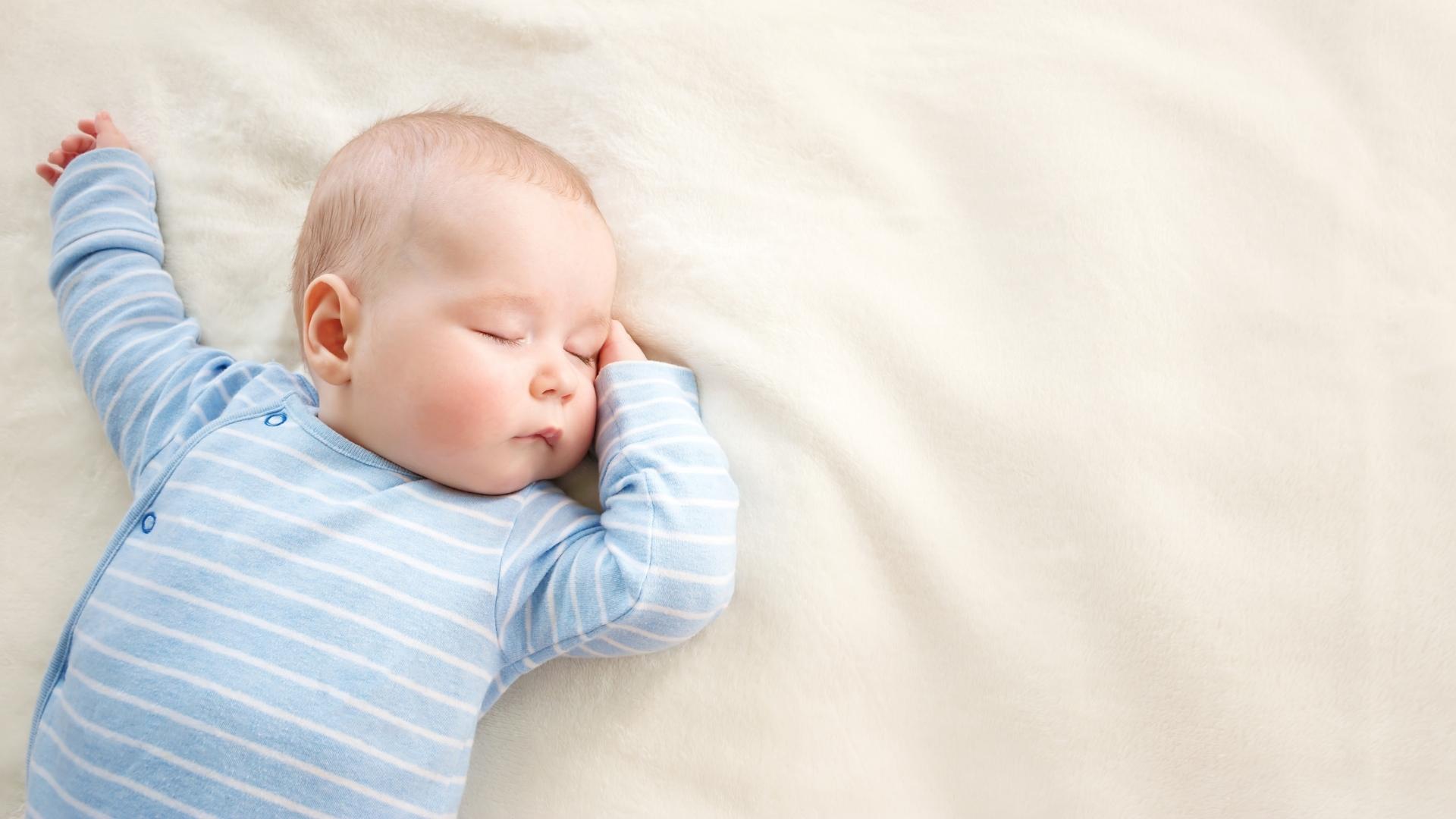You know that a bedtime routine is important for your little one… But when can you establish a baby bedtime routine? Can you be too late? What does a bedtime routine for baby include?
After 40 years as a Norland Nanny and mother, here’s everything you need to know about establishing a baby bedtime routine that works for you and your little one.

Table of Contents
When Should You Start a Bedtime Routine for Baby?
While the first few weeks when you bring your baby home are driven by meeting your baby’s demands for feeding, changing, and sleeping… by around 6 to 8 weeks you should notice that a more regular pattern is beginning to emerge in your little one’s sleep schedule.
This 2-month-old mark is now the time to start building on your little one’s natural development and introduce a more structured bedtime routine at the end of the day.
But don’t worry if you’re reading this thinking “My baby is 9-months old, am I too late?”… It’s NEVER too late to start establishing a bedtime routine, 2-months-old is simply the earliest you can start implementing the basic framework of a baby bedtime routine.
Why A Baby Bedtime Routine Is Important
We all have a circadian rhythm that predicts how we sleep and young babies are no different.
As their sleep patterns start to settle and develop, establishing a bedtime routine is a vital part of nurturing your little one’s sleep and wake cycles.
By sticking to a consistent nightly pattern, you are supporting your baby’s natural adjustment to the day-night cycle.
On top of this, a recognizable bedtime routine creates a sense of security and familiarity for your baby. They learn to recognize the predictable sequences of events that signal that it’s time for sleep.
In my experience, bedtime routines established at an early age lessen the impact of sleep regressions and often make future sleep training unnecessary or short-lived.
In addition and very importantly, regular and quality sleep is crucial for your baby’s growth and memory development.
I am always going on about how important sleep is and that if you get sleep right, so many other aspects of raising a child fall into place. Therefore, it is very apparent how important a baby’s bedtime routine is!
The Best Bedtime Routine For Baby: Step-By-Step
If you have not established a baby bedtime routine yet or if you would like to adjust your current evening routine to better suit your lifestyle and baby’s wellbeing, here is my guide to the best baby bedtime routine:
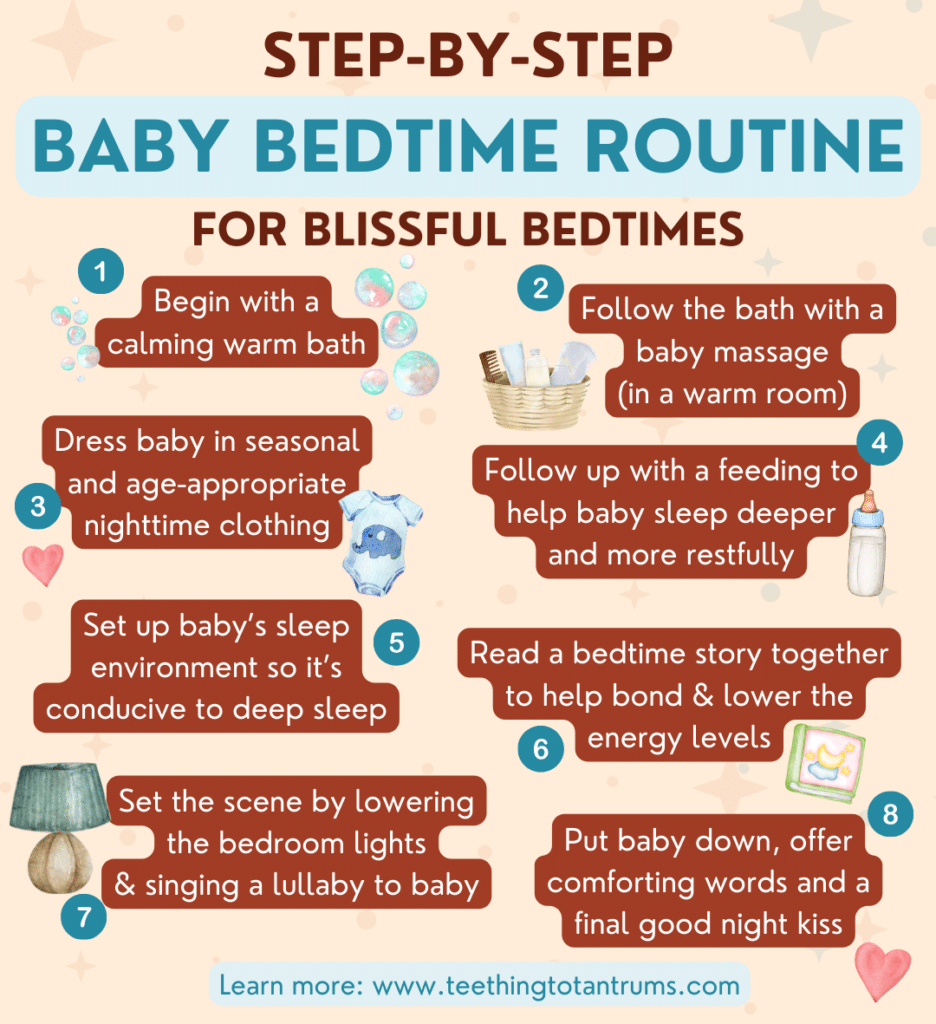
- Begin with a calming bath. A gentle bath helps to signal to your baby that the day is winding down. The warm water is soothing and can help your little one become sleepy.
- Integrate a baby massage. A soft, gentle massage after bathtime can relax your baby’s muscles and calm them. Use this time to bond and provide your baby with a sense of security.
- Put on a diaper and pajamas. Changing into night clothes differentiates day from night. Choose comfortable clothes that will keep your baby at the right temperature.
- Follow up with a feeding. Feeding your baby will ensure they don’t wake up hungry during the night. A full tummy contributes to a deeper and more restful sleep. NOTE: Feeding before you read a story is a perfect way to avoid falling into the feeding-to-sleep trap which is wonderful when your baby is a newborn but a hard habit to break when they are older.
- Set the sleep environment. A dark, cool room with a white noise machine can provide a conducive atmosphere for sleep. Ensure the crib is safe and free from loose bedding.
- Read a bedtime story. The sound of your voice is comforting to your baby. Reading is another of my favorite staples and improves language skills and becomes a sleep cue that bedtime is near.
- Set the scene. Lowering the lights and keeping the environment peaceful will help your baby understand it’s time to rest. Use this time for cuddles and singing a lullaby or playing a sleep app.
- Offer comforting words and a goodnight kiss. This provides reassurance and is an expressive part of the wind-down routine. Consistency with this step helps your little one feel secure and loved.
By implementing these steps, your baby’s bedtime routine will definitely promote good sleep habits and provide an essential sense of comfort associated with sleep.
NOTE: This is only a guide. Your baby’s bedtime routine may differ depending on their preferences and your family’s priorities. The most important aspects of a baby bedtime routine should be that it follows the same order of events every night, it happens at the same time every night, and is calm, cozy, and relaxing.
Tips To Establish A Baby Bedtime Routine
Establishing a baby’s bedtime routine should not be rushed.
After all, consistency is key to helping your baby understand and adapt to the pattern.
But there are some extra steps you can take to help your baby’s bedtime routine quickly establish itself:
- Always try to begin the bedtime routine at the same time each night to create a sense of predictability. It should follow the same sequence of events every night, even on weekends and when away from home.
- Do not underestimate how important the lead-up to bedtime is. Consider developing a wind-down routine before bedtime. Start with calming activities and lower the energy levels, then transition gradually from play space to bedtime routine space and incorporate soothing routines such as a massage, singing lullabies, and reading books.
- I would always recommend giving baby a warm bath followed by a massage. This marks a clear shift in their routine from active play to a more tranquil setting and is crucial in helping your baby recognize that bedtime is approaching. Soft lullabies and reading books after the last feed and before saying goodnight are also soothing and help signal to your baby that it’s time to rest.
- You can begin to establish a naptime schedule to reduce overtiredness as your baby develops a marked difference between their daytime and nighttime sleep. To start establishing a nap schedule, know how much age-appropriate sleep your little one needs in 24 hours (read this), and then build the nap schedule around your baby’s wake windows and natural sleep patterns. Once you know when your baby is likely to need a nap, avoid overstimulation too close to naptime. Finally, pay attention to your baby’s sleep cues and act on them quickly.
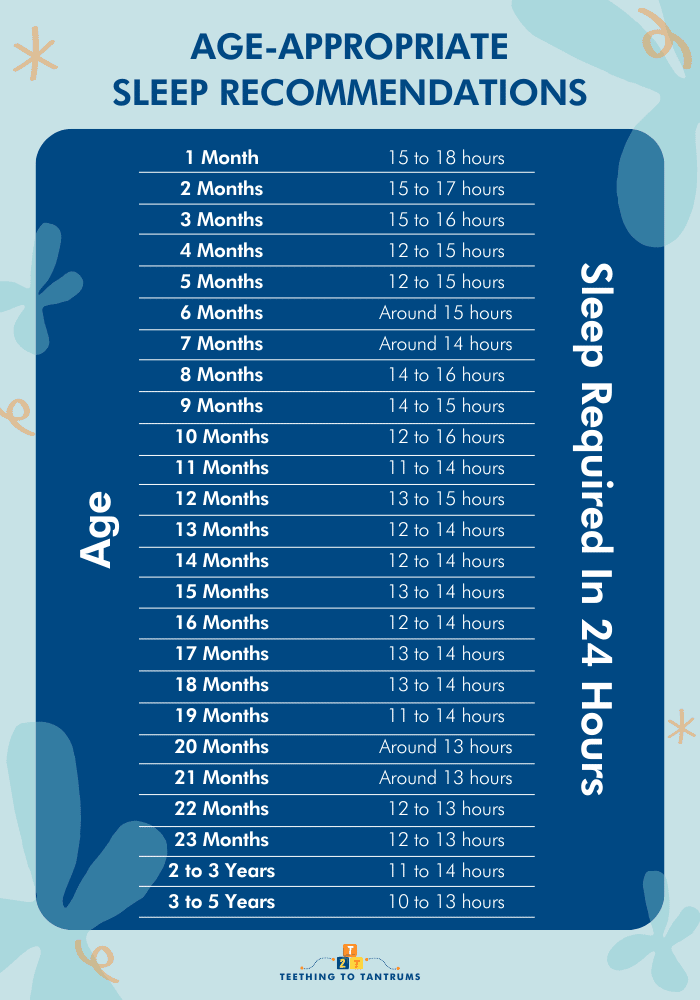
Is It Best To Give A Baby A Bath Every Night?
I have always favored a bath as part of the bedtime routine as it is calming and soothing for baby and gives a clear signal that things are winding down at the end of the day.
However, some parents may be concerned that bathing your baby every day could lead to dry skin.
Pediatricians often suggest that for very young infants, two to three baths a week is enough to maintain good hygiene.
But, for me, a bath is so much more than being about good hygiene.
A bath is equally about cultivating a bonding and calming experience at the of the day for you and your baby.
If you do choose to include a bath in your baby’s nightly routine, use gentle bath products that nourish your baby’s sensitive skin (breast milk baths are wonderful for young skin) and keep an eye out for any skin reactions.
You may decide to adjust the frequency of baths depending on your baby’s skin sensitivity and activity level.
Looking to get your little one to sleep quickly and effortlessly? Check out my Bedtime and Nap Cheat Sheet and master the art of making daytime naps and bedtimes as seamless as possible.
A bedtime & nap cheat sheet so good your little one will ask you to put them to bed...
Laura Williams "This is a life saver! I'm so glad I downloaded your bedtime & nap cheat sheet. My little one actually asked me to put him to bed last night! Unbelievable! Thank you so much!"
Click Here For The FREE Cheat Sheet
What Time Should Baby Go To Bed By Age
As your baby grows, sleep schedules and wake windows become more predictable.
By the time your baby is 4-6 months old, the American Academy of Pediatrics suggests introducing a sleep schedule that includes a regular bedtime and daytime naps taken at roughly the same time each day.
Use the following table as a general guide for your baby’s bedtime by age:
| Age (Months) | Ideal Bedtime |
| Newborn | 8-11 PM |
| 1 Month | 8-11 PM |
| 2 Months | 8-11 PM |
| 3 Months | 8-10 PM |
| 4 Months | 6.30-8 PM |
| 5 Months | 6.30 – 8 PM |
| 6 Months | 6.30-7.30 PM |
| 7-12 Months | 6.30-7.30 PM |
It is important to keep in mind that newborns don’t yet distinguish between day and night and that for the initial 3-4 months, they do not have a set bedtime. They typically need 14-17 hours of sleep over 24 hours, in stretches of a few hours at a time.
Does It Matter If Baby’s Bedtime Is Early Or Late?
Yes, it does matter if baby’s bedtime is early or late as the timing of your baby’s bedtime will definitely impact the quality of their nighttime sleep.
An earlier bedtime usually aligns with a baby’s natural circadian rhythm which is essentially the internal clock that helps regulate sleep and wake patterns.
When bedtime matches this rhythm, your little one is more likely to fall asleep easily and sleep more soundly.
Babies who go to bed late may become overtired, making it harder for them to settle down.
Over time, overtiredness can lead to disrupted sleep both night and day and cause behavior issues that interfere with your little one’s ability to fall asleep independently and sleep soundly.
Your baby’s sleep schedule can also affect their core body temperature, which drops during the night. This drop is a natural part of the sleep cycle and helps to promote restful sleep.
Having an earlier bedtime helps this natural decline, which in turn provides better rest.
I usually advise that your babies should be put to bed between 6 and 7.30 p.m.
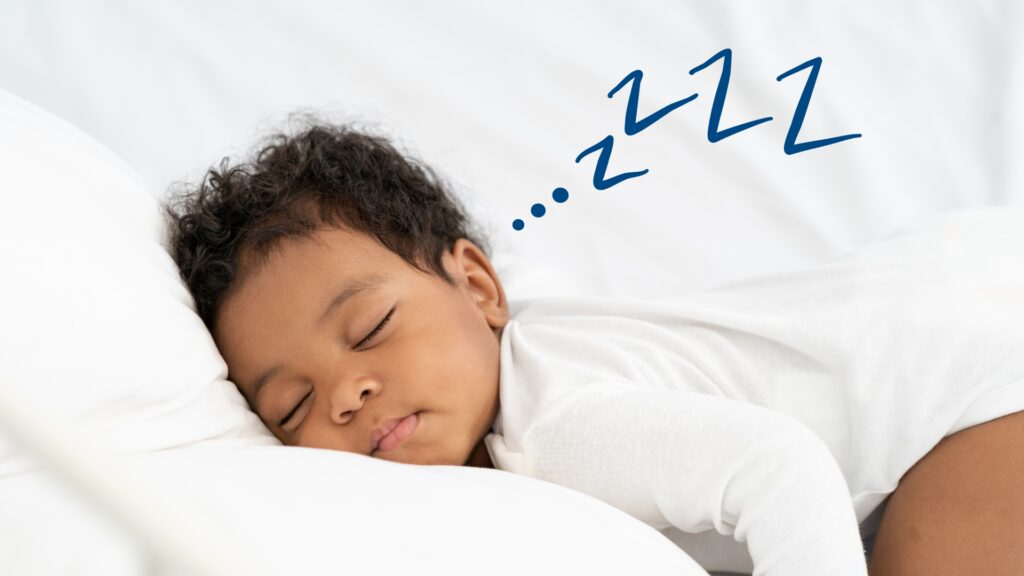
When Do You Change A Baby Bedtime Routine?
Once your baby’s bedtime routine is established, there will be very little that requires changing.
However, there may be times when the bedtime routine is disrupted by normal developmental occurrences such as
- Sleep regressions. These can occur at any age but commonly around 4 months, 6 months, 9 months, and 12 months.
- Transitioning out of night feedings, known as weaning, may also require you to adjust your routine to reduce sleep problems such as offering a more substantial feed or ensuring they have a bigger meal before the bedtime routine begins.
- Teething, illness, or separation anxiety can also trigger sleep problems.
These are all periods when a previously good sleeper may start waking more often.
If this is the case then your best solution is to stick with the program, but to have some flexibility during these periods to offer cuddles and love.
Gentle sleep training methods may be useful, bear in mind that if your little one is teething or unwell you will need to provide extra comfort until they are recovered.
NOTE: Be aware that when you notice new milestones, like crawling or walking, your baby might need extra time to wind down leading up to bedtime. Also, make sure they have plenty of opportunities during the day to practice their new skills.
My Baby Cries During The Bedtime Routine, What Can You Do?
If your baby cries a lot during their bedtime routine, it can naturally be quite distressing.
In an older baby, I would usually put this down to your baby being overtired and so my first step would be to look at daytime sleep to ensure they are getting enough.
Here’s a guide for for much sleep your little one needs.
If they are getting adequate daytime rest, then I would suggest bringing the bedtime forward by 15 minutes every night to see if they fall asleep more easily.
Ensure the bedtime routine is calm and soothing and never rushed too.
If your baby is younger, there are often more factors at play that need to be adjusted to stop bedtime crying.
- Firstly, some young babies do not like being undressed so try putting a washcloth on their tummy in the bath. This can often calm a baby who does not enjoy being exposed to the air.
- Trying a baby massage can often be very effective at calming upset babies too.
- Try swaddling as this can often comfort your little one, as it mimics the security of the womb.
- White noise machines are also great for blocking out ambient noise and can help your baby self-soothe and ease separation anxiety.
If all else fails, consult your pediatrician so that they can check for any underlying conditions that may be disturbing your baby at bedtime they can also offer guidance tailored to your baby’s individual needs.

Frequently Asked Questions About A Baby Bedtime Routine
Navigating baby bedtime routines can raise many questions. This section aims to answer some of the most common ones.
Q: How can I adapt my baby’s bedtime routine as they grow up?
A: As your baby grows, their sleep needs change, and so should their bedtime routine. Start by adjusting bedtime earlier if they seem overtired, or later if they’re not sleepy. You may also phase out nighttime feedings and introduce quiet activities as they approach their first birthday. Be aware that daytime sleep also needs to be adjusted as they grow as their naps will impact nighttime sleep.
Q: What is a typical bedtime routine for a 4-month-old baby?
A: A typical bedtime routine for a 4-month-old may include a calming bath, a baby massage, a final feeding, and some gentle cuddling and reading a book. Try to put them down while they’re drowsy but still awake. This encourages them to self-soothe and fall asleep independently, setting the stage for good sleep habits.
Q: How late is too late for a baby’s bedtime?
A: Any bedtime after 8pm is too late for baby. An overly late bedtime may lead to an overtired baby, making it harder for them to fall asleep and stay asleep. Most babies do well with a bedtime between 6:30 pm and 7:30 pm. However, watch for your baby’s sleep cues, like rubbing eyes and fussiness, to determine the best time. Consistency is key to establishing a healthy sleep routine.
Q: What should I not do before a baby bedtime routine?
A: Before a baby’s bedtime routine, avoid stimulating activities that can make your baby too excited. Turn off screens and turn down loud music close to bedtime as these can interfere with your baby’s wind-down process. Most importantly try not to let your baby become overtired, as this can disrupt their ability to fall asleep easily and stay asleep.
Need More Parenting Help?
- Download our FREE Bedtime & Nap Sleep Cheat Sheet. It’s a free, easy-to-use and proven formula designed for parents of 0-5 year olds to master the art of consistently undisturbed and restful sleep without the yelling, nagging or exhausting long-winded evenings.
- Check out our Parenting Toolbox. You’ll get access to expertly-chosen products that you can guarantee are the best for your little one and your wallet.
- Are you looking for personalized guidance to navigate the challenges of parenting? I offer 1-on-1 consultations to bring you tailored strategies and actionable advice to help support your child's growth and well-being with confidence.

A bedtime & nap cheat sheet so good your little one will ask you to put them to bed...
Laura Williams "This is a life saver! I'm so glad I downloaded your bedtime & nap cheat sheet. My little one actually asked me to put him to bed last night! Unbelievable! Thank you so much!"
Click Here For The FREE Cheat Sheet
